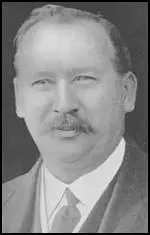Vernon Hartshorn (original) (raw)

Vernon Hartshorn was born at Cross Keys, Pontywaun, Monmouthshire, on 16th March 1872, the elder son of Theophilus Hartshorn, coalminer, and his wife, Helen Gregory, daughter of a farm labourer.
After being educated at a local school he worked as a miner at Risca before being employed as a clerk in a colliery company's office at Cardiff Docks. He later returned to the mine as a checkweighman (a representative elected by coal miners to check the findings of the mine owner's weighman where miners are paid by the weight of coal mined). In 1899 he married Mary Matilda, daughter of Edward Winsor, a Somerset coalminer. They had two sons and a daughter.
Hartshorn, who was a Primitive Methodist, joined the Independent Labour Party. In 1905 he was elected miners' agent of the Maesteg district of the South Wales Miners' Federation. In the 1910 General Election Hartshorn was the unsuccessful ILP candidate for Mid-Glamorgan. The following year he was elected to its executive council and to the national executive council of the Miners' Federation of Great Britain. As his biographer, W. L. Cook, has pointed out: "Harshorn... was one of a number of young radicals who displaced more established figures, following the Cambrian combine strike of 1910–11. He took a leading part in the minimum wage strike of 1912 and was prominent in local government business."
During the First World War, Hartshorn supported the war effort and served on the coal trade organization committee, the coal controllers' advisory committee, and the industrial unrest committee in South Wales. His loyal support resulted in him being awarded the OBE in 1918. As Herbert Tracey has pointed out: "A new spirit of insurgence, aggravated by the spectacle of gross profiteering, manifested itself, and, outrunning the tactics of the official leaders, kept affairs in a state of constant turmoil. Hartshorn, for one, had deliberately sacrificed much of his ascendancy through his steady adherence to a national line of conduct. It was not difficult to foment distrust of a man who had been made an OBE, and during the latter part of the war and the first year or so subsequently Vernon Hartshorn saw the rebellion against his leadership become formidable."
In the 1918 General Election, was returned unopposed as the first member for the newly formed Ogmore division of Glamorgan. In 1920 Hartshorn resigned from the national executive council of the Miners' Federation of Great Britain because of a a disagreement over the tactics employed in the strike. He returned in 1922 after being elected president of the South Wales Miners' Federation.
In the 1923 General Election, the Labour Party won 191 seats. Although the Conservative Party had 258 seats, Herbert Asquith announced that the Liberal Party would not keep the Tories in office. If a Labour Government were ever to be tried in Britain, he declared, "it could hardly be tried under safer conditions". Ramsay MacDonald agreed to head a minority government, and therefore became the first member of the party to become Prime Minister. MacDonald had the problem of forming a Cabinet with colleagues who had little, or no administrative experience. MacDonald's appointments included Vernon Hartshorn as Postmaster General.
In October 1924 the MI5 intercepted a letter written by Grigory Zinoviev, chairman of the Comintern in the Soviet Union. The Zinoviev Letter urged British communists to promote revolution through acts of sedition. Vernon Kell, head of MI5 and Sir Basil Thomson head of Special Branch, told MacDonald that they were convinced that the letter was genuine. It was agreed that the letter should be kept secret but someone leaked news of the letter to the Times and the Daily Mail. The letter was published in these newspapers four days before the 1924 General Election and contributed to the defeat of MacDonald. The Conservatives won 412 seats and formed the next government. With his 151 Labour MPs, MacDonald became leader of the opposition in the House of Commons.

Vernon Hartshorn (1924)
In 1927 Harshorn. was appointed to the seven-man Indian Statutory Commission, chaired by, Sir John Simon. In the 1929 General Election the Labour Party won 288 seats, making it the largest party in the House of Commons. Ramsay MacDonald became Prime Minister again, but as before, he still had to rely on the support of the Liberals to hold onto power. MacDonald announced that a place for Hartshorn would be found as soon as the commission had completed its work and in 1930 he was appointed lord privy seal with special responsibility for the government's policy on employment.
Vernon Hartshorn remained in the government until his death at Hill Crest, Maesteg, Glamorgan, on 13th March 1931.
Primary Sources
(1) Herbert Tracey, The Book of the Labour Party (1925)
War intervened. The miners found their position threatened by a form of attack, supported by insidious "patriotic " propaganda, which they could hardly have foreseen. Provocations of an impudent kind culminated in an attempt to abrogate the right to strike. South Wales accepted this challenge: Mr. Lloyd George, hurrying down in person to eat his words, and with them a competent portion of humble pie, barely staved off an industrial revolt which must have brought his cabalistic administration toppling down.
Matters were temporarily composed, but the ferment went on. A new spirit of insurgence, aggravated by the spectacle of gross profiteering, manifested itself, and, outrunning the tactics of the official leaders, kept affairs in a state of constant turmoil. Hartshorn, for one, had deliberately sacrificed much of his ascendancy through his steady adherence to a national line of conduct. It was not difficult to foment distrust of a man who had been made an O.B.E., and during the latter part of the War and the first year or so subsequently Vernon Hartshorn saw the rebellion against his leadership become formidable. It was not checked by his unopposed return to Parliament in 1918, for Ogmore: incidentally no one has since been found willing to oppose him.